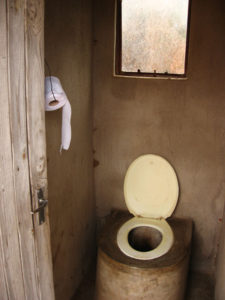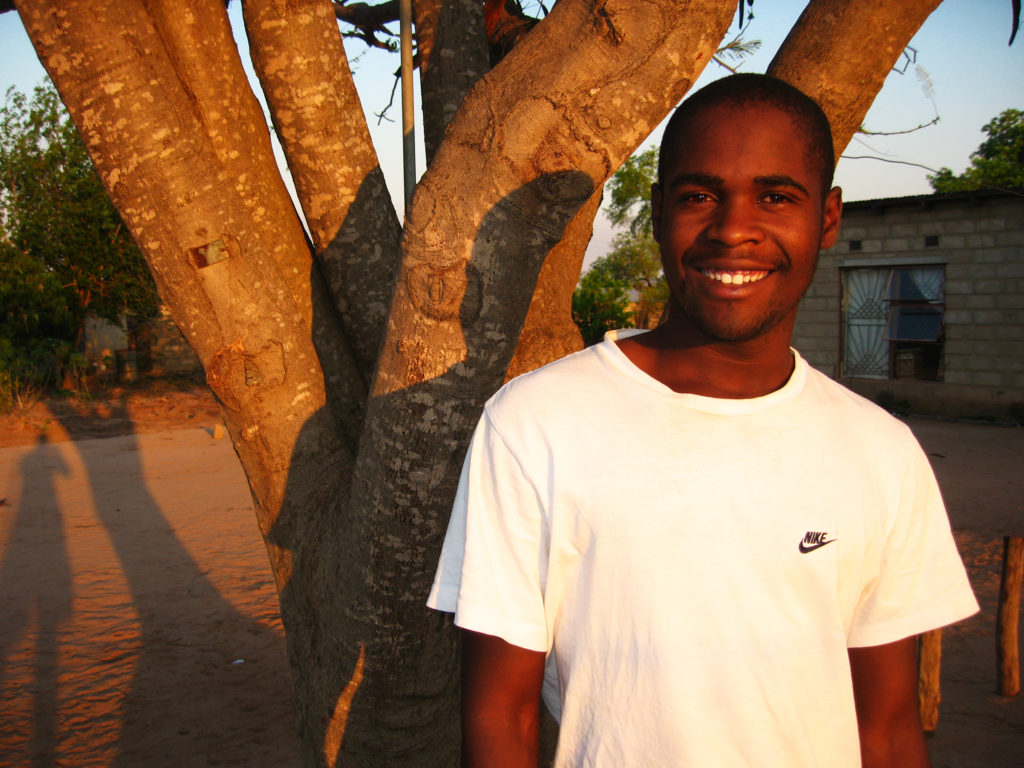One of the most frustrating and perplexing things since we’ve been here happened to us the other day. We were outside one night eating dinner with the Pakistani guys who run the shop across the street (they rent it from our host family), when one of our host brothers walked up to talk to them. When he saw us there, he casually informed us that he had just eaten one of our two chickens.
We thought maybe it was a joke. He was so nonchalant about it. He said he ate it because it was the one that fell into our pit toilet (which is another story altogether). I figured I might as well try to play along, so I asked him how he knew it was the same one. So, he shoved his hands up under my nose and said to smell, that he knew he got the right one because he could smell it (even though it had been out of the pit toilet for over a month).
He said we had mentioned how we weren’t going to eat it since it had fallen into the toilet and that he was really hungry. I told him he owed us 35 rand (the price we paid for the chicken some months ago) and he looked a bit surprised. He didn’t talk with the Pakistanis for long and wandered back over to his house.
This host brother of ours, Nkosinathi, has definitely been my best friend so far in the village. He’s only 19, just finished high school over a year ago, but he’s a great young man and has been a great friend. He’s smart, he understands the concept of differing cultures, his English is very fluent (mainly from watching a lot of TV), he eats dinner with us often, he sometimes takes us around the village, he tutors us in xiTsonga twice a week, I’ve been helping him look for a job or a scholarship, and he came sightseeing with us one day when Lora’s sister was visiting. In a country where we’re told that anyone could turn criminal, Nkosinathi was the one guy I trusted outright.
Well, after the announcement he just made to us about stealing and slaughtering our chicken, we didn’t know what to do. So, we went and checked first to see if it was the truth. Sure enough, only one chicken was left. So what was the next step? I was stunned that he, Nkosinathi, would steal one of our chickens.
We’ve been in our village long enough now that we’re beginning to understand how the family structure works here. We knew the normal next step was to inform his grandmother (one of the three matriarchs in our host family) and possibly his uncle (the Vice Principal at our nearest school, the pastor of the family church, the man whose house we’re living in, and also the one most responsible for Nkosinathi’s general well-being).
The culturally-appropriate next step was definitely to tell a member of his family, particularly someone responsible for him. Because in traditional Shangaan culture, no one’s completely autonomous, even young men who should be finding jobs and working. There’s always someone you’re accountable to and someone, or several, you’re responsible for.
When something goes wrong, the whole line of responsibility is involved. If it’s not fixed, the one who did the wrong thing brings shame on everyone around: those who he’s accountable to and those who he’s responsible for. So, to risk being redundant, the right thing for us to do was to tell the one who’s responsible for the person who did the wrong thing, so that the one who’s in charge can negotiate a solution and thus avoid shame.
So, we’ve been in the culture long enough now that we decided to go tell his grandmother, who was the only one responsible for him who was around at the time. His grandmother, who often has some bad mood swings, was furious. She sent some nearby grand-children or great grand-children (those two generations often blend together in our host family) to go fetch Nkosinathi so she could reckon with his recklessness.
By the time he got back over to us, his eyes were already watering and he was clearly in a different mood. And this is in a culture that rarely cries, whether men or women. By the time he got within range of us to hear him, he was already in the middle of some profuse apologies and the apologies continued for several minutes.
And right after came the explanations and the excuses. He was hungry, he said. He needed to take care of his younger brothers. He has no job and no future, but no one in the family really helps him out any more. He even confessed, with some obvious hesitation, that his father sometimes sends money to his grandmother to take care of him and his brothers but she keeps it all for herself. He said it’s hard to be so hungry so often.
The thing is, in traditional Shangaan culture, families are deeply connected. A HUGE part of our host family lives right across the street from us in one giant inter-connected compound (and a few more of them on either side of us on our side of the street). They’ve got three grandmothers, all married to one man who died a few years back. Also living there are MANY of those grandmothers’ children. And with them they’ve got their children’s children, and those children’s children. And maybe a few of their children’s children; I’m not totally sure. But they multiply fast here in South Africa.
The family members still living in the village, as many of them as there are, are mostly still following the old traditions. The way it works is that if any of them have a child, they’re also considered the child of their mother’s sisters and their father’s brothers, calling those aunts and uncles also mothers and fathers. And those cousins of theirs are also considered (and called) brothers and sisters.
So, traditionally, they all live together in one giant inter-connected web and just like a mother and father is traditionally responsible for their child, so are these multiplied mothers and fathers also responsible for their “children”. Basically, the responsibility for a child is spread out to the entire extended family, with no one person taking on all the responsibility by themselves.
I think that would be a good thing – in a society where money is hard to come by, where the weather’s not always what’s hoped for in terms of raising crops, and where death by disease is rampant. This should mean precious resources shared and spread more evenly and it should mean very few orphans. They call this way of living “ubuntu.”
But in this culture’s clash with Westernization and globalization, the same thing that would normally tie the families together is also starting to fragment them apart. Because what the traditional Shangaan system serves to do is take away individual responsibility (the type we’re familiar with in America) and replace it with communal responsibility. Personally, I suppose it’s OK not to have your own private responsibilities so long as others are responsible for you and you’re still responsible for others.
But Westernization in developing countries such as South Africa often removes the concept of communal responsibility and replaces it with the idea of individual fulfillment. What’s left is a certain number of people (always growing) who have no concept of either communal responsibility or individual responsibility, and they instead focus their efforts on individual fulfillment – after all, it’s what they see on imported American TV shows, right?
So men and women are making babies left and right around here and most of them have almost no feeling of individual responsibility to care for them. After all, the grandmothers (who still feel the communal responsibility) are more than willing to look after the new generation. But many of the new generation, in their daily encounters with the Western world both on TV and in town, lose their concept of communal responsibility and leave the family compound far behind. Instead, they go out to find some way to make a lot of money and buy the things they’d like to have for themselves. And when they find out they’re burdened by some recent offspring, they usually send them back home to the rest of the family to care for, sometimes sending money to help, sometimes not.
So while not technically “orphans”, very few members of the last two generations here have had their actual fathers in their lives. Of the now-occurring generation, many of them don’t even have their actual mothers. They’re all off elsewhere too busy enjoying their own lives and don’t want to bother concerning themselves with children that other people still see as part of their own communal responsibility. Whereas the grandparents and great-grandparents taking care of all their children are the ones who are still “traditional”; you may even say they’re unable to confront the new way of life that the children themselves are constantly encountering.
So more than in any other instance I’ve heard of, you have a HUGE generational gap. Children are being parented by their grandparents and/or great-grandparents. They’re being parented by people too old and “traditional” to offer a practical model for how to deal with the challenges and pressures of the new society that these same children will have to live in. And these children see their own parents avoiding them and the traditional communal responsibility in order to pursue personal gratification.
So what can they do? What are these left-behind kids supposed to make of their lives? Especially these young men, who are in a position that they’re “traditionally” supposed to begin working and contributing to the rest of the family? And then the rest of the family often forgets to contribute to them when they’re jobless, an all-too-common situation in today’s South African economy.
My friend Nkosinathi is a good kid, smart too. In America, you’d say “he’s got a bright future ahead of him!” But in rural South Africa, where he sees only a privileged few (now privileged more by money than by race) attain that future, it’s easy to grow despondent and try not to think about it. But as a smart kid, Nkosinathi can’t help but think about his future, about making something of himself. His dream is to learn about computers and get a job working with them, in any capacity.
So, when Nkosinathi realized that word of his chicken-stealing had gotten out to his family, when his grandmother threatened to tell his uncle, he really started to panic. The tears were really streaming down his cheeks. Nkosinathi’s uncle, like me, has been trying to help find scholarship and work-study applications for him. So Nkosinathi was worried that his uncle’s punishment to him would be to no longer help him apply for these scholarships and internships. And trust me, there’s NO way for Nkosinathi, stuck as he is in a rural South African village, to find these things on his own. He was afraid his whole possibility of a future was being shot down right in front of him.
So, while we were trying to grapple with the idea that one of our chickens, an animal that Lora had come to affectionately consider as a pet, had been stolen and eaten by the one guy in the village we trusted most; that same guy’s mind was racing with how one ill-considered mistake cost him his life’s dreams. I asked him why he didn’t buy food with the money we pay him for tutoring (which isn’t much, but is all that Peace Corps allows us to offer), and he said he often buys treats for his brothers living with him (those he’s responsible for) so that they’ll have a snack after school. He said he’d tutor us for free for a year, for two years, four times a week (twice what it is now), anything, just tell him what to do to make up for it so long as his uncle doesn’t find out.
I didn’t know what to do. Clearly we had different thoughts going through our heads. I told him we’d think about it that night and talk with him after church the next day. He said he probably wouldn’t be there, he’d have to run away now. He said he might even commit suicide, he’s been so depressed, he has no job, no future ahead of him. He was obviously distraught.
So I said whatever I could to convince him to stick around long enough to have a talk with us the next day. We even asked his grandmother not to tell his uncle, but she said there was no getting out of it for him. Thankfully, Nkosinathi said he’d stay long enough to talk to us the following afternoon. We all walked off in separate directions, with lots of different emotions.
We really didn’t know what to do. I mean, we’re beginning to understand the kind of social pressure and dysfunction that the young people here are living with. But Nkosinathi also stole our chicken when we trusted him, when we’ve fed him freely on plenty of occasions. I don’t think there was any real excuse, cultural or otherwise, for him to take and eat another person’s chicken without their permission. Other members of his family have confirmed this. If he took our chicken, what else might he take? We went to bed without any clear decisions on the matter.
Well, the next morning, we decided to take an altogether different approach than we’d been previously considering, than anything we’d ever done before. Jesus said in Luke 6:29, “If anyone strikes you on the cheek, offer the other also; and from anyone who takes away your coat do not withhold even your shirt.”
At the end of ourselves with what to do, we decided to do that: to give him the other chicken also. Not ask for any repayment, not ask for any work done on our behalf to make up for it, continue to pay him as usual for tutoring sessions, continue to invite him over for dinner, and let him know the other chicken was his to eat at any time he wanted it.
It was definitely a tough decision. More for Lora than for me… she’s really grown attached to those chickens, even though they haven’t produced nearly as many eggs as we’d have liked. But honestly, it seemed to be the right decision. It was our first chance to make a choice like that and we decided to try it out.
So, Nkosinathi came over that afternoon, definitely more composed than the previous night and we talked about it. When we got around to telling him our decision, he was pretty surprised, “embarrassed”, as he put it, saying that nothing like that’s ever happened to him before. Later that evening, he ate the other chicken.
And that was pretty much that. We haven’t seen any miracle take place. We don’t know that he won’t steal from us again. But, he’s putting more work into preparing for our tutoring sessions. And although he hasn’t started coming by again with the usual frequency that he used to, he still borrows books from me and we still invite him in for dinner. He’s a pretty good kid, and rather than cripple him with a weight of guilt and shame from one mistake, we opted to restore him with grace. And it’s a lot more comfortable for us to resume our friendship with him that way, too.
What else may come of our decision about “if a man takes away your chicken, give him the other also”, well, I don’t know. That’s between Nkosinathi and God. We just hope we’ve given him something easy to work with. It’s definitely the kind of grace God shows us on a regular basis.
As for Nkosinathi’s uncle, he did find out. As far as I know, he still hasn’t talked to Nkosinathi about it yet. He agreed that he definitely wasn’t going to take away his help and support in scholarship and internship applications. He said if Nkosinathi doesn’t make something of himself, that’s also shame for him as his uncle, but that if he does well, that’s also good for him as his uncle. It’s that “traditional” concept of communal responsibility again. Which side Nkosinathi will take in this culture change, I don’t know. Hopefully he’ll get one of these scholarships soon and will have the opportunity to make of himself anything he chooses.







